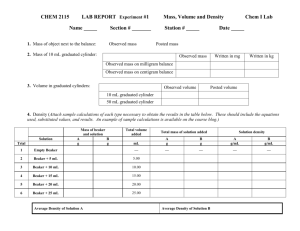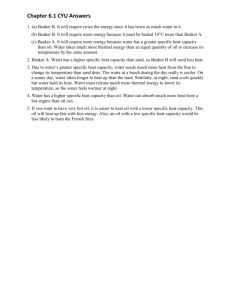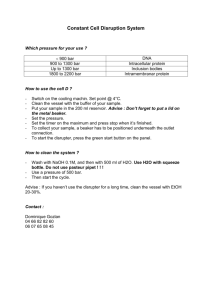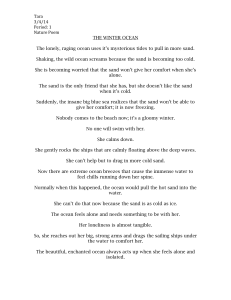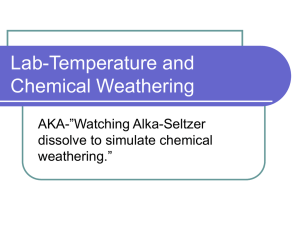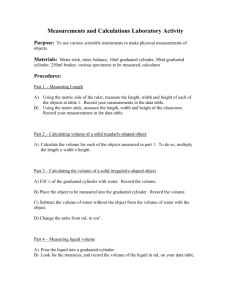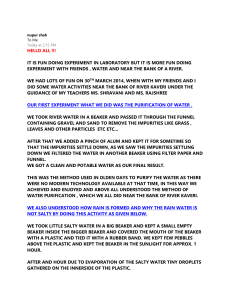Land vs. Water Lab Analysis
advertisement
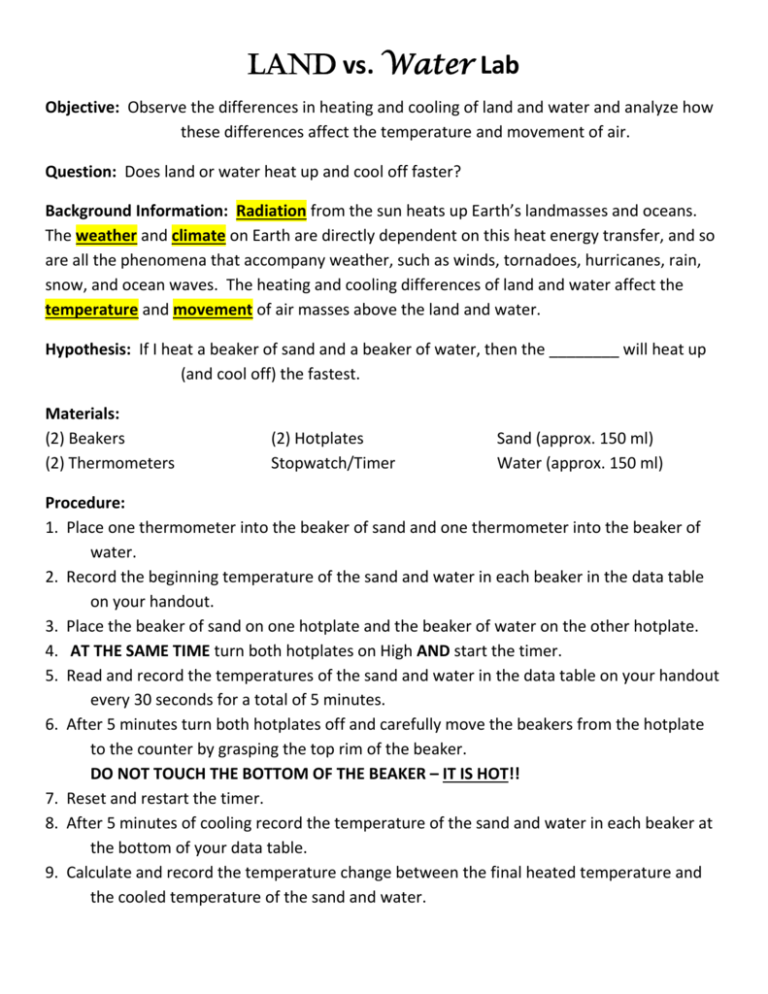
Land vs. Water Lab Objective: Observe the differences in heating and cooling of land and water and analyze how these differences affect the temperature and movement of air. Question: Does land or water heat up and cool off faster? Background Information: Radiation from the sun heats up Earth’s landmasses and oceans. The weather and climate on Earth are directly dependent on this heat energy transfer, and so are all the phenomena that accompany weather, such as winds, tornadoes, hurricanes, rain, snow, and ocean waves. The heating and cooling differences of land and water affect the temperature and movement of air masses above the land and water. Hypothesis: If I heat a beaker of sand and a beaker of water, then the ________ will heat up (and cool off) the fastest. Materials: (2) Beakers (2) Thermometers (2) Hotplates Stopwatch/Timer Sand (approx. 150 ml) Water (approx. 150 ml) Procedure: 1. Place one thermometer into the beaker of sand and one thermometer into the beaker of water. 2. Record the beginning temperature of the sand and water in each beaker in the data table on your handout. 3. Place the beaker of sand on one hotplate and the beaker of water on the other hotplate. 4. AT THE SAME TIME turn both hotplates on High AND start the timer. 5. Read and record the temperatures of the sand and water in the data table on your handout every 30 seconds for a total of 5 minutes. 6. After 5 minutes turn both hotplates off and carefully move the beakers from the hotplate to the counter by grasping the top rim of the beaker. DO NOT TOUCH THE BOTTOM OF THE BEAKER – IT IS HOT!! 7. Reset and restart the timer. 8. After 5 minutes of cooling record the temperature of the sand and water in each beaker at the bottom of your data table. 9. Calculate and record the temperature change between the final heated temperature and the cooled temperature of the sand and water. Land vs. Water Lab Analysis (cont.): It takes less energy to change the temperature of land compared to water. This means that land heats and cools more quickly than water and this difference affects the climate of different areas on Earth. Climates in coastal areas are moderated by the ocean. Because water does not heat up as easily as land does, oceans can help keep coastal areas cool during the summer when inland temperatures soar. During the day a sea breeze will develop as air over the land heats up and rises. As this rising air leaves it creates a lower pressure area over the land compared to the air pressure over the water. This pressure difference causes the cooler, higher pressure air over the ocean to flow inland to take the place of the rising air over the land. At night the reverse process occurs creating a land breeze. For the air above the land AND the water complete the following: (1) use arrows to illustrate the motion of the air (2) label whether the air is WARM or COOL (3) label whether the air is HIGH or LOW pressure, (4) label whether there is a SEA BREEZE or LAND BREEZE. Additionally, because it takes a great amount of energy to change the temperature of water the ocean retains (holds) a lot of thermal energy. So even in the winter, when inland temperatures drop, coastal areas stay moderately warm. Land vs. Water Lab Objective: Observe the differences in heating and cooling of land and water and analyze how these differences affect the temperature and movement of air. Question: Does land or water heat up and cool off faster? Background Info: ________________ from the sun heats up Earth’s landmasses and oceans. The _______________ & ______________ on Earth are directly dependent on this heat energy transfer, and so are all the phenomena that accompany weather, such as winds, tornadoes, hurricanes, rain, snow, and ocean waves. The heating and cooling differences of land and water affect the ______________ & ______________ of air masses above the land and water. Hypothesis: If I heat a beaker of sand and a beaker of water, then the ________ will heat up (and cool off) the fastest. Observations: Analysis: 1. Which SAND WATER substance Time Temp Time Temp heated up the (min.) (°C) (min.) (°C) fastest? 0 0 ___________ 0.5 0.5 2. Which 1 1 substance 1.5 1.5 2 2 required the 2.5 2.5 most energy 3 3 to change its 3.5 3.5 temperature? 4 4 ___________ 4.5 4.5 3. Based on 5 5 the data, what can you infer about the effects on the air temperature above land compared to water during the daytime? In other words, will the air heat up faster or slower over land compared to water? Explain your answer. ___________________________________________________________ ____________________________________________________________________________ 4. Based on the data and your answer to the previous question, what can you infer about the movement of the air above land compared to the movement of air above water during the daytime? _____________________________________________________________________ Land vs. Water Lab Analysis (cont.): It takes _________ energy to change the temperature of land compared to water. This means that land heats and cools more ______________ than water and this difference affects the _________________ of different areas on Earth. _______________ in coastal areas are moderated by the ocean. Because water does not heat up as easily as land does, oceans can help keep coastal areas ________ during the summer when inland temperatures soar. During the day a _____________________ will develop as air over the land heats up and _________. As this rising air leaves it creates a ______________ pressure area over the __________ compared to the air pressure over the water. This pressure difference causes the cooler, higher pressure air over the ocean to flow inland to take the place of the rising air over the land. At night the reverse process occurs creating a _______________________. For the air above the land AND the water complete the following: (1) use arrows to illustrate the motion of the air (2) label whether the air is WARM or COOL (3) label whether the air is HIGH or LOW pressure, (4) label whether there is a SEA BREEZE or LAND BREEZE. Additionally, because it takes a great amount of energy to change the temperature of water the ocean ____________ (holds) a lot of ____________________________. So even in the winter, when inland temperatures drop, coastal areas stay moderately ___________.
